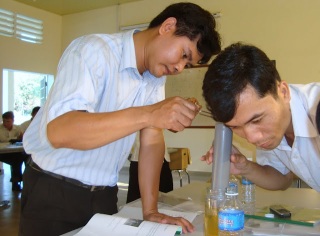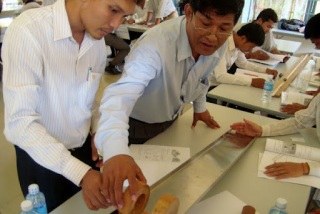The concept underlying the workshop – and actually the whole programme – is the TPACK concept (Mishra and Koehler,2006; Koehler and Mishra, 2007; Abbitt, 2011), an extension of Shulman’s idea of pedagogical content knowledge. This is knowledge of pedagogy that is applicable to the teaching of specific content. TPACK extends this idea with technologies. The core idea of TPACK is that the use of technologies in education – and in Cambodia analogous technologies such as experiments, posters or cards play a much larger role than digital technologies – should be considered in relation to content and pedagogy. Just using an experiment or an animation just for the sake of it, without thinking about how it will make your lesson better is not useful. This may seem obvious but many interventions seem to do just this, introducing certain technologies (blogging, wikis…) or pedagogies (concept mapping, learner-centred methodologies…) without detailed consideration of the curriculum content teachers actually have to cover.
The workshop is the result of three years of preparatory work with a wonderful team of teachers and teacher trainers from the college in Kandal. Since 2008 we’ve worked with them to select materials and activities for those curriculum topics they found most challenging, try them out in their lessons, develop accessible manuals and short experiment videos (See for example this experiment video on toilet rolls and pressure) and learn to facilitate the activities themselves.
Manuals have been officially approved by the Cambodian Ministry of Education, an important milestone in Cambodia, as it means that they can be distributed and endorsed nation-wide. Although we do hope that these manuals by themselves are inviting, an official stamp of approval is likely to act as an extra stimulation. It’s great to see teacher trainers themselves facilitate the workshop without much involvement of us. Above all, they enjoy it as well to explain all these experiments and activities to their colleagues as well.
The downside of involving all stakeholders is a very long development cycle. Getting from a first selection of content until the final, approved product has taken us several years. Having a first edition published sooner would have enabled us to envisage a second edition within the programme lifetime.
Targeting teacher trainers has been a deliberate decision. As they teach future teachers the potential impact is very high. However, the adopted cascading strategy bears the risk of a watering down the content. Measuring impact is notoriously difficult, perhaps even more so in Asia, where stated preference methods are prone to response and cultural bias.



[…] PCK seems most useful to me as a theoretical framework to underpin sensible professional development. To be discussed in a next […]